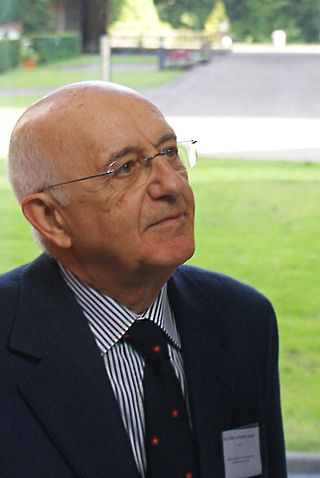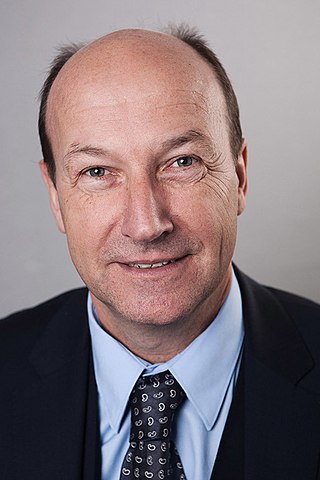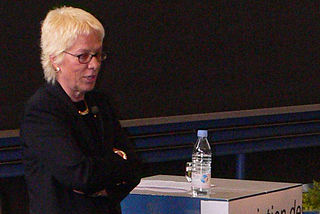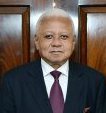
The International Criminal Court is an intergovernmental organization and international tribunal seated in The Hague, Netherlands. It is the first and only permanent international court with jurisdiction to prosecute individuals for the international crimes of genocide, crimes against humanity, war crimes and the crime of aggression. The ICC is distinct from the International Court of Justice, an organ of the United Nations that hears disputes between states.

The International Criminal Tribunal for the former Yugoslavia (ICTY) was a body of the United Nations that was established to prosecute the war crimes that had been committed during the Yugoslav Wars and to try their perpetrators. The tribunal was an ad hoc court located in The Hague, Netherlands.

International criminal law (ICL) is a body of public international law designed to prohibit certain categories of conduct commonly viewed as serious atrocities and to make perpetrators of such conduct criminally accountable for their perpetration. The core crimes under international law are genocide, war crimes, crimes against humanity, and the crime of aggression.

Antonio Cassese was an Italian jurist who specialized in public international law. He was the first President of the International Criminal Tribunal for the former Yugoslavia and the first President of the Special Tribunal for Lebanon which he presided over until his resignation on health grounds on 1 October 2011.

Serge Brammertz is a Belgian prosecutor, academic and jurist. He serves as the chief prosecutor for the International Residual Mechanism for Criminal Tribunals (IRMCT) since 2016. He also served as the chief prosecutor for the International Criminal Tribunal for the former Yugoslavia (ICTY) from 2008 until its closure in 2017.

In the practice of international law, command responsibility is the legal doctrine of hierarchical accountability for war crimes, whereby a commanding officer (military) and a superior officer (civil) is legally responsible for the war crimes and the crimes against humanity committed by his subordinates; thus, a commanding officer always is accountable for the acts of commission and the acts of omission of his soldiers.

The states parties to the Rome Statute of the International Criminal Court are those sovereign states that have ratified, or have otherwise become party to, the Rome Statute. The Rome Statute is the treaty that established the International Criminal Court, an international court that has jurisdiction over certain international crimes, including genocide, crimes against humanity, and war crimes that are committed by nationals of states parties or within the territory of states parties. States parties are legally obligated to co-operate with the Court when it requires, such as in arresting and transferring indicted persons or providing access to evidence and witnesses. States parties are entitled to participate and vote in proceedings of the Assembly of States Parties, which is the Court's governing body. Such proceedings include the election of such officials as judges and the Prosecutor, the approval of the Court's budget, and the adoption of amendments to the Rome Statute.

The Special Tribunal for Lebanon (STL), also referred to as the Lebanon Tribunal or the Hariri Tribunal, is a tribunal of international character applying Lebanese criminal law under the authority of the United Nations to carry out the investigation and prosecution of those responsible for 14 February 2005 assassination of Rafic Hariri, the former Lebanese prime minister, and the deaths of 21 others, as well as those responsible for connected attacks.

Karim Asad Ahmad Khan is a British lawyer specialising in international criminal law and international human rights law, who has served as Prosecutor of the International Criminal Court since 2021.

John Hocking of Australia is the United Nations Assistant Secretary-General, Registrar of the International Criminal Tribunal for the former Yugoslavia (ICTY). He served concurrently as the Registrar of the Mechanism for International Criminal Tribunals (UNMICT) from January 2012 until December 2016.

Hassan Bubacar Jallow is a Gambian judge who has served as Chief Justice of the Gambia since February 2017. He was the Prosecutor of the International Criminal Tribunal for Rwanda (ICTR) from 2003 to 2016, and Prosecutor of the International Residual Mechanism for Criminal Tribunals (IRMCT) from 2012 to 2016, both at the rank of United Nations Under Secretary-General. He served as Minister of Justice and Attorney General from 1984 to 1994 under President Dawda Jawara.

Joint criminal enterprise (JCE) is a legal doctrine used during war crimes tribunals to allow the prosecution of members of a group for the actions of the group. This doctrine considers each member of an organized group individually responsible for crimes committed by group within the common plan or purpose. It arose through the application of the idea of common purpose and has been applied by the International Criminal Tribunal for the former Yugoslavia to prosecute political and military leaders for mass war crimes, including genocide, committed during the Yugoslav Wars 1991–1999.

Charles Ayodeji Adeogun-Phillips is a former United Nations genocide and war crimes prosecutor, international lawyer and founder of Charles Anthony (Lawyers) LLP.

United Nations Security Council resolution 1503, adopted unanimously on 28 August 2003, after recalling resolutions 827 (1993), 955 (1994), 978 (1995), 1165 (1998), 1166 (1998), 1329 (2000), 1411 (2002), 1431 (2002) and 1481 (2003), the Council decided to split the prosecutorial duties of the International Criminal Tribunal for the former Yugoslavia (ICTY) and the International Criminal Tribunal for Rwanda (ICTR) which had previously been under the responsibility of one official, Carla Del Ponte, since 1999.

The International Residual Mechanism for Criminal Tribunals, also referred to as the IRMCT or the Mechanism, is an international court established by the United Nations Security Council in 2010 to perform the remaining functions of the International Criminal Tribunal for the former Yugoslavia (ICTY) and the International Criminal Tribunal for Rwanda (ICTR) following the completion of those tribunals' respective mandates.
Robin Vincent, CMG, CBE was an international expert in the administration of justice, and a major contributor to the creation and effective functioning of international criminal tribunals.
James Kirkpatrick Stewart is a Canadian lawyer with over thirty years of experience as Crown counsel handling criminal trials and appeals for the prosecution, including more than eight years working with the United Nations in international criminal law prosecutions as a trial and appellate counsel and legal manager. Stewart was nominated by Fatou Bensouda, Prosecutor for the International Criminal Court (ICC) in The Hague, as one of three candidates for election to the post of ICC Deputy Prosecutor (Prosecution). He was duly elected by the Assembly of States Parties on 16 November 2012 for a period of nine years. Mr Stewart was sworn in on 8 March 2013 and as Deputy Prosecutor of the ICC, he will report directly to the Prosecutor.

Mohamed Chande Othman is a Tanzanian lawyer and a former Chief Justice of Tanzania.

Gabrielle Louise McIntyre (Australian) is an international legal practitioner, jurist, and the Chairperson of the Seychelles' Truth, Reconciliation and National Unity Commission.
Maureen Harding Clark is an Irish judge who served as a Judge of the Extraordinary Chambers in the Courts of Cambodia since June 2019, a Judge of the High Court from 2006 to 2014, a Judge at the International Criminal Court from 2003 to 2006, and a Judge at the International Criminal Tribunal for the former Yugoslavia from 2001 to 2003.















